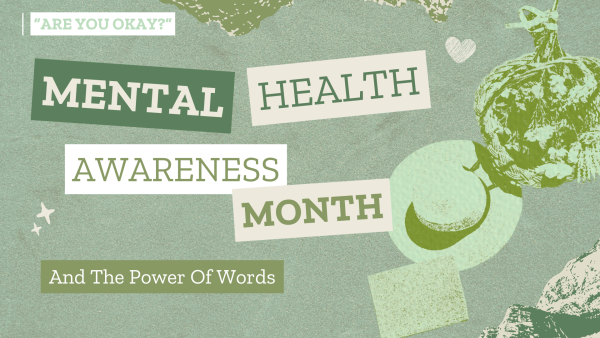
“Are you okay?”
Although this inquiry contains only three words, it is an impactful one to acknowledge someone’s state of mind, feelings, and emotions. Words hold endless meaning, and accepting someone’s feelings and emotions ensures that those words are used positively. Mental Health Awareness Month in May contributes to the message that everyone should be optimistic about discussing mental health issues instead of avoiding them. There are numerous ways to take care of yourself and others, beginning with the simple task of being kind and empathetic.
Mental Health Awareness Month has been recognized since 1949 in the United States. It started as a mental health awareness week launched by Clifford W. Beers, the founder of the Mental Health America organization. Mental Health Awareness Month provides a spotlight on several common mental illnesses faced by youth and adults alike, including certain anxiety disorders, PTSD, and depression.
According to Mental Health America, “11.5% of youth are experiencing severe major depression” (MIH), and ABC News reveals that as of 2023, depression rates in the United States skyrocketed (ABC News). According to various media outlets, the top contributing factors to depression in today’s youth include excessive social media intake, poor sleep quality, and unrealistic academic, social, or family expectations.
Clinical depression must be medically diagnosed, and symptoms may include but are not limited to anxiety, extreme sleepiness, an inability to sleep, fatigue, agitation, or a lack of concentration. Experiencing only one or two of these symptoms likely does not mean you are depressed, but it is important to keep them in mind if you ever find yourself questioning the well-being of yourself or a person close to you.
Many people also suffer from stress and anxiety, and students are encouraged to keep a balance between school and mental health. Yorba Linda High School’s wellness counselor, Melinda Heim (S), shares, “Stress motivates us to work towards solving our problems. Reframing thoughts to view stress as an acceptable emotion or a tool has been found to reduce many associated symptoms. The goal is to manage stress, not to eliminate it. Negative coping strategies (drugs, alcohol, fighting, ditching school, withdrawal) can be quick fixes but are harmful because they can be dangerous and make stress worse in the long run. Eat right, get outside, do activities, [and] sleep at least 8 hours! These are great ways to take care of yourself, and are directly tied to mental health.”
It can be tough to overcome the effects of depression in particular, and the best thing someone can do in that situation is to seek professional help. If you know someone who is struggling with depression, you could say that you are there for them while letting them stay in control of their own decisions. Many people just want to be comforted and listened to, and Melinda Heim (S) advises that you should “Avoid statements such as ‘I know exactly what you are going through,’ ‘Don’t be sad, you have reasons to be happy,’ or ‘I have a lot of anxiety too.’ I think the best thing to do in this situation is to be there for your friend, but don’t feel like you need to fix the situation. Listen, and ask questions to help them process, but be careful not to put your own values on someone else.” While offering words of encouragement can go a long way, The Providence Center affirms that you should avoid lectures and speeches on what you might do in their place.
At high schools across the nation, Mental Health Awareness Month is recognized with dress-up days and activities. At Yorba Linda High School, students participated in spirit days, including Tune in Tuesday, Wear Green Wednesday, Tie-Dye Thursday, and Mustang Family Friday. This week celebrates spreading optimism and doing what we can to be kind to each other. Melinda Heim (S) states, “Teens that have a positive mindset are happier and don’t care as much what others think about them. That doesn’t mean they go around disregarding people, on the contrary, they go around making positive moments with people…Don’t laugh along at someone, or contribute to negative peer interactions. Avoid the drama. I promise, your mental health will drastically improve.”
Students can play their part in spreading awareness of mental health by regularly checking up on their friends and family. Asking “Are you okay?” is a simple yet meaningful question that cultivates relationships and validates people’s feelings. Next time you believe someone is down or experiencing mental challenges, talk to them and ensure they are both seen and heard.


























